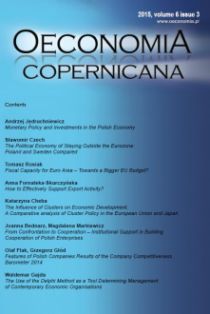The Political Economy of Staying Outside the Eurozone: Poland and Sweden Compared
The Political Economy of Staying Outside the Eurozone: Poland and Sweden Compared.
Author(s): Sławomir CzechSubject(s): Economy, National Economy, Supranational / Global Economy
Published by: Instytut Badań Gospodarczych
Keywords: euro adoption; systemic idiosyncrasy; euro outsider; political constraints; power distribution
Summary/Abstract: This paper deals with the issue of political constraints put on economic policies that derive from the distribution of power in democratic societies. Poland and Sweden are both euro-outsiders that are obliged to adopt the euro, but recent developments within the Eurozone and related to the 2008+ crisis engendered widespread reluctance among the public to give up national currencies. Within a short time, the general support for the euro turned strongly negative, making it a grave challenge for politicians to pursue the adoption of the common currency. On this background, we reflect on the alleged correspondence between these two countries that would allow to follow similar policies toward euro introduction. We point to the idiosyncrasy of the Swedish case that makes it virtually impossible to emulate its policies by a country like Poland with very different long-term goals and starting conditions. By doing so, we highlight the context of policymaking that seems crucial to a successful art of political economy.
Journal: Oeconomia Copernicana
- Issue Year: 6/2015
- Issue No: 3
- Page Range: 23-43
- Page Count: 21
- Language: English

